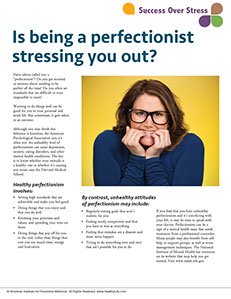SYMPTOM CHECKER
CONDITIONS
Male
Female
Child
Arm, Hand & Shoulder Concerns
Legs & Feet Concerns
Dental & Mouth Concerns
Ear & Nose
Eye Conditions
Head Conditions
Arm, Hand & Shoulder Concerns
Legs & Feet Concerns
Front
Back
Arm, Hand & Shoulder Concerns
Dental & Mouth Concerns
Ear & Nose
Eye Conditions
Head Conditions
Arm, Hand & Shoulder Concerns
Dental & Mouth Concerns
Ear & Nose
Eye Conditions
Head Conditions
Front
Back
Arm, Hand & Shoulder Concerns
Neck Links
Head & Neck Concerns
Arm, Hand & Shoulder Concerns
Neck Links
Head & Neck Concerns
Front
Back
Online Clinic
Wise Healthcare
Is being a perfectionist stressing you out?
Print on Demand
Have others called you a “perfectionist”? Do you get worried or anxious about needing to be perfect all the time? Do you often set standards that are difficult or even impossible to meet?
Wanting to do things well can be good for you in your personal and work life. But sometimes, it gets taken to an extreme.
Although you may think this behavior is harmless, the American Psychological Association says it’s often not. An unhealthy level of perfectionism can cause depression, anxiety, eating disorders, and other mental health conditions. The key is to know whether your attitude is a healthy one or whether it’s causing you stress, says the Harvard Medical School.
Healthy perfectionism involves:
• Setting high standards that are achievable and make you feel good
• Doing things that you enjoy and that you do well
• Knowing your priorities and values, and spending your time on them
• Doing things that pay off for you in the end, rather than things that cost you too much time, energy and frustration
By contrast, unhealthy attitudes of perfectionism may include:
• Regularly setting goals that aren’t realistic for you
• Feeling overly competitive and that you have to win at everything
• Feeling that mistakes are a disaster and must never happen
• Trying to do something over and over that isn’t possible for you to do
If you find that you have unhealthy perfectionism and it’s interfering with your life, it may be time to speak with your doctor. Perfectionism can be a sign of a mental health issue that needs treatment from a professional counselor. Many people may also benefit from self-help or support groups, as well as stress management techniques. The National Institute of Mental Health has resources on its website that may help you get started. Visit www.nimh.nih.gov.
This website is not meant to substitute for expert medical advice or treatment. Follow your doctor’s or health care provider’s advice if it differs from what is given in this guide.
The American Institute for Preventive Medicine (AIPM) is not responsible for the availability or content of external sites, nor does AIPM endorse them. Also, it is the responsibility of the user to examine the copyright and licensing restrictions of external pages and to secure all necessary permission.
The content on this website is proprietary. You may not modify, copy, reproduce, republish, upload, post, transmit, or distribute, in any manner, the material on the website without the written permission of AIPM.
2021 © American Institute for Preventive Medicine - All Rights Reserved. Disclaimer | www.HealthyLife.com
















































